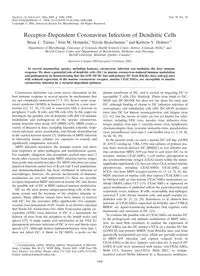
2004 Receptor-Dependent Coronavirus Infection of Dendritic Cells PDF
Preview 2004 Receptor-Dependent Coronavirus Infection of Dendritic Cells
JOURNAL OF VIROLOGY, May 2004, p. 5486–5490 Vol. 78, No. 10 0022-538X/04/$08.00�0 DOI: 10.1128/JVI.78.10.5486–5490.2004 Copyright © 2004, American Society for Microbiology. All Rights Reserved. Receptor-Dependent Coronavirus Infection of Dendritic Cells Brian C. Turner,1 Erin M. Hemmila,1 Nicole Beauchemin,2 and Kathryn V. Holmes1* Department of Microbiology, University of Colorado Health Sciences Center, Denver, Colorado 80262,1 and McGill Cancer Centre and Departments of Biochemistry, Medicine, and Oncology, McGill University, Montreal, Quebec, Canada2 Received 4 August 2003/Accepted 9 February 2004 In several mammalian species, including humans, coronavirus infection can modulate the host immune response. We show a potential role of dendritic cells (DC) in murine coronavirus-induced immune modulation and pathogenesis by demonstrating that the JAW SII DC line and primary DC from BALB/c mice and p/p mice with reduced expression of the murine coronavirus receptor, murine CEACAM1a, are susceptible to murine coronavirus infection by a receptor-dependent pathway. Coronavirus infections can cause severe alterations of the host immune response in several species by mechanisms that are not completely understood (7, 9, 33). Severe acute respi- ratory syndrome (SARS) in humans is caused by a new coro- navirus (12, 17, 28, 37) and is associated with a decrease in peripheral T cells, B cells, and NK cells (10). In this paper we investigate the possible role of dendritic cells (DC) in immune modulation and pathogenesis of the murine coronavirus, mouse hepatitis virus strain A59 (MHV-A59). MHV causes a variety of diseases in mice, including hepatitis, enteritis, respi- ratory infection, acute encephalitis, and chronic demyelination in the central nervous system (7). Outbreaks of MHV infection in laboratory mouse colonies are expensive to remedy and significantly compromise research. MHV infection modulates the immune system and alters host responses to other pathogens and noninfectious agents. For example, allogeneic skin transplants grafted onto mice 3 weeks after recovery from acute MHV infection survive longer than grafts onto uninfected mice (9). MHV infection can cause impaired function and/or loss of B-cell and T-cell populations, and immunomodulation has been attributed to infection of macrophages; however, the precise mechanisms of immuno- modulation are not well understood (7). Here we describe receptor-dependent MHV infection of murine DC and discuss the possible role of DC in MHV-induced immune modulation. DC are the most potent antigen-presenting cells of the im- mune system and the keystone of the adaptive immune re- sponse. Many different viruses have been shown to interact with DC, but the outcomes differ significantly. For example, vaccinia virus inoculation of DC results in an abortive infection that blocks DC maturation (16), while Venezuelan equine en- cephalitis (VEE) virus infection of DC is a mechanism for delivery of virus from the periphery to the lymph nodes and spleen (27). A single amino acid substitution in the VEE E2 glycoprotein prevents infection of DC in vivo and blocks virus spread (27). Although human immunodeficiency virus type 1 does not infect DC, it binds to DC-SIGN, a lectin on the plasma membrane of DC, and is carried on migrating DC to susceptible T cells (20). Similarly, Ebola virus binds to DC- SIGN and DC-SIGNR but does not use them for entry into DC, although binding of virions to DC enhances infection of macrophages and endothelial cells (40). DC-SIGN mediates entry into DC for human cytomegalovirus and dengue virus (22, 41), but the means of entry are not yet known for other viruses, including VEE virus, measles virus, influenza virus, herpes simplex virus type 1, varicella-zoster virus, lymphocytic choriomeningitis virus, vesicular stomatitis virus, pseudorabies virus, parainfluenza virus type 3, and Sindbis virus (1, 3, 19, 30, 34–36, 38, 39). In the present study, we used a murine DC cell line (JAWS II; ATCC catalog no. CRL-1194) and cultures of primary mu- rine bone marrow-derived DC (BMDC) to test whether mu- rine coronavirus MHV-A59 can bind to and infect DC via its receptor, murine CEACAM1a, a cell surface glycoprotein in the carcinoembryonic antigen (CEA) family within the immu- noglobulin superfamily (2). Several other CEA-related murine glycoproteins, including CEACAM1b, CEACAM2, and bCEA, also have MHV receptor activity (6, 13, 14, 32, 45, 46). MHV infection of murine cells that express CEACAM1a can be blocked with an anti-murine CEACAM1a monoclonal an- tibody (MAb) called CC1 (15). CEACAM1a is expressed on apical membranes of epithelial cells in the gastrointestinal and respiratory tracts, kidneys, B cells, neutrophils, macrophages, activated T cells, thymic stromal cells, and small vascular en- dothelial cells (8, 21, 23, 29). Kammerer et al. showed that isoforms of CEACAM1a expressed on BALB/c and C57BL/6 BMDC are signal-transducing molecules that regulate early maturation and activation of DC (25). To evaluate the possible role of CEACAM1a on murine DC in the pathogenesis and immune modulation of MHV infec- tion, we used flow cytometry to analyze the expression of CEACAM1a and the DC marker CD11c on a murine DC line (JAWS II) and primary BMDC from BALB/c mice and from genetically manipulated p/p mice, which are partially resistant to MHV-A59 infection and express reduced levels of CEACAM1a in the liver, kidneys, and colon (4). A total of 106 JAWS II cells were incubated with mouse anti-CEACAM1a MAb CC1, hamster anti-CD11c MAb HLC, or isotype- matched control MAbs followed by a fluorescein isothiocya- * Corresponding author. Mailing address: Department of Microbi- ology, Campus Box B-175, SOM Bldg., Room 4801, 4200 East 9th Ave., Denver, CO 80262. Phone: (303) 315-7220. Fax: (303) 315-6785. E-mail:
